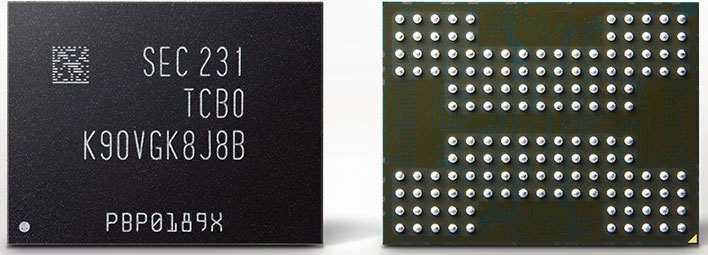Samsung on Monday announced it has begun mass producing its 8th generation vertical NAND (V-NAND) memory chips in 1-terabit (Tb) triple-level cell (TLC) form. Billed as the industry's highest bit density, Samsung's newest V-NAND solution boasts the highest storage capacity to day to drive more capacious solid state drives (SSDs), in addition to impressive speed gains.
These chips are designed for storage solutions that will end up in next-generation enterprise setups. They're based on the Toggle DDR 5.0 interface, which is the latest NAND flash standard, and features input and output (I/O) speeds of up to 2.4 gigabits per second (Gbps). That's a sizable 1.2X gain performance uplift over the
previous generation.
"As market demand for denser, greater-capacity storage pushes for higher V-NAND layer counts, Samsung has adopted its advanced 3D scaling technology to reduce surface area and height, while avoiding the cell-to-cell interference that normally occurs with scaling down,” said SungHoi Hur, Executive Vice President of Flash Product & Technology at Samsung Electronics.
"Our eighth-generation V-NAND will help meet rapidly growing market demand and better position us to deliver more differentiated products and solutions, which will be at the very foundation of future storage innovations," Hur added.
It's not unusual for the enterprise segment to get first dibs on cutting-edge technology (though it doesn't always work out that way). As such, it will be interesting to see what speeds these chips enable in next-gen PCIe 5 storage solutions.
That will depend in large part on the controller hardware. On the consumer side, PCIe 5.0 x4 provides up to around 16GB/s of bandwidth. A few months ago,
Adata teased a pair of high-speed PCIe 5 SSDs rated to deliver up to 14GB/s of sequential performance.
From Samsung's vantage point, it's
8th generation V-NAND will "serve as the cornerstone" for future enterprise storage solutions, while also extending into the automotive market.

